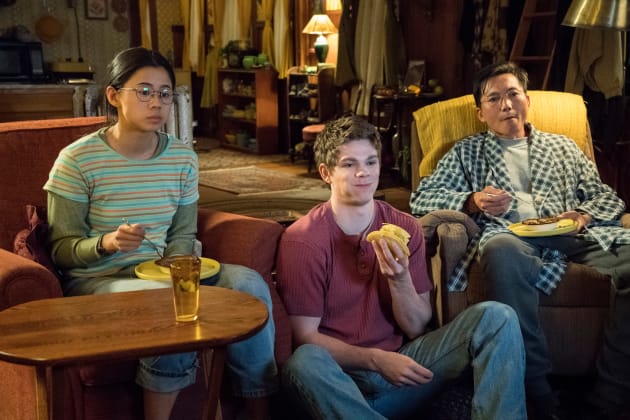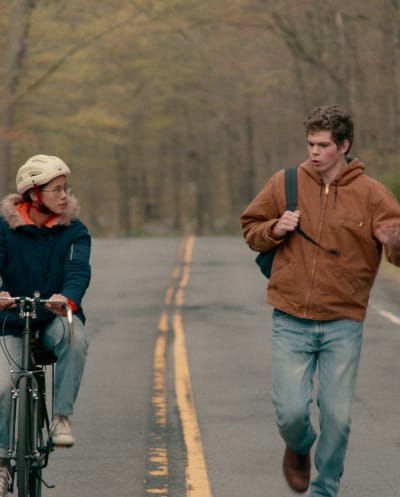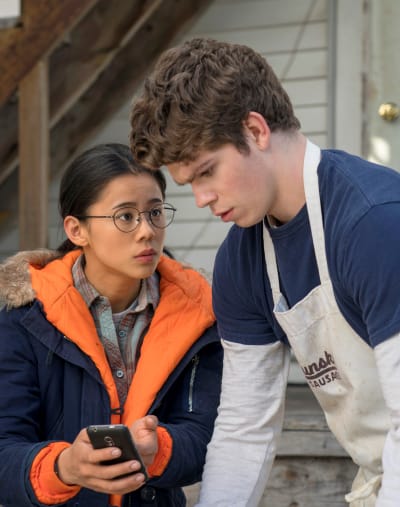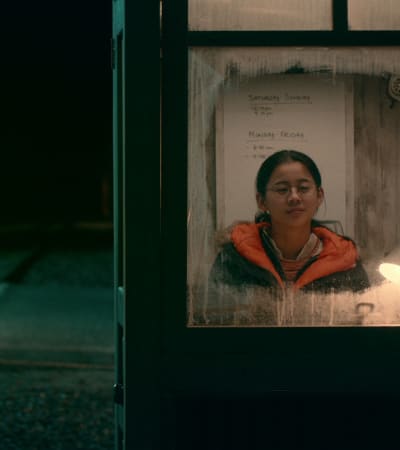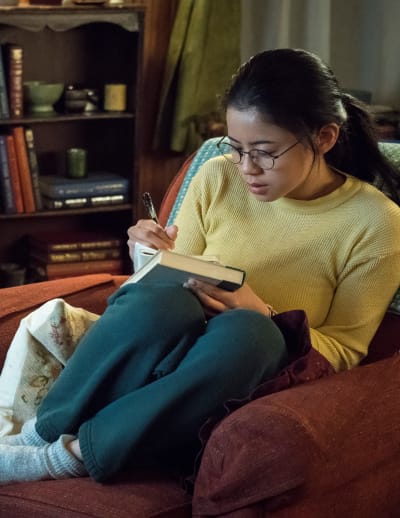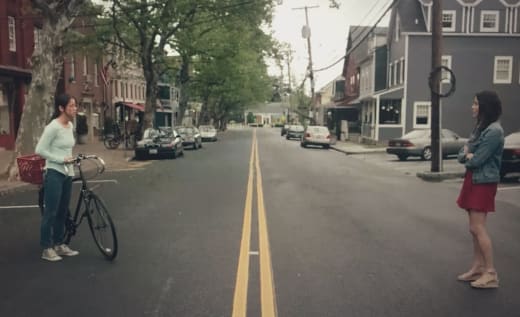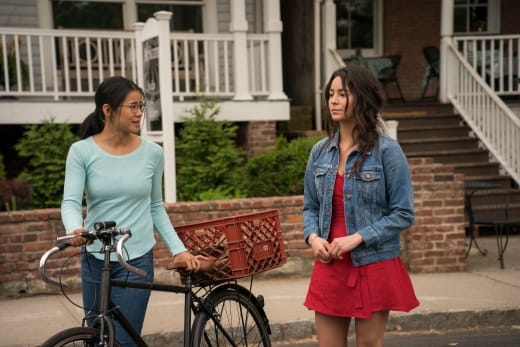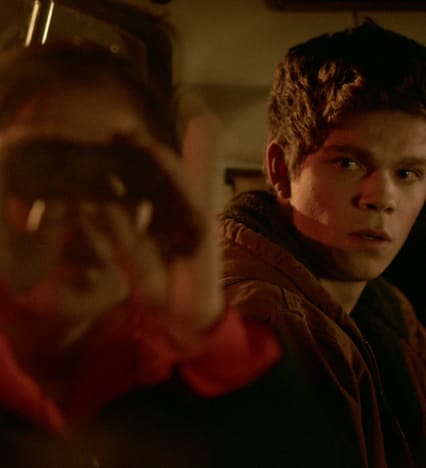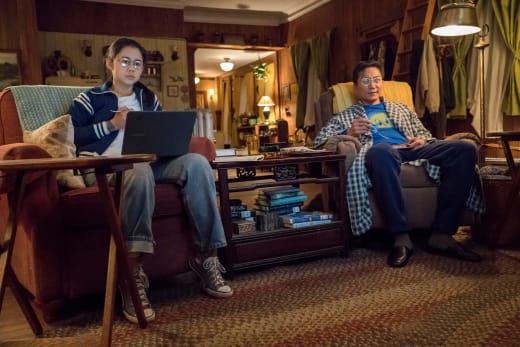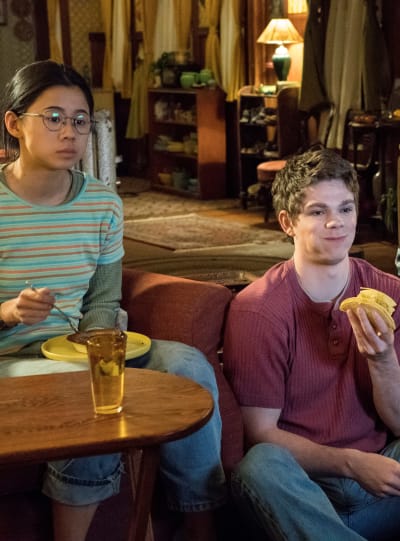Love is many things and everything.
Love comes in many forms, and that’s what made The Half of It a different kind of love story. It starts with a standard concept, and then it turns the tradition on its head to become something beautiful and unexpected.
Netflix’s The Half of It is a coming of age story done right.
The beauty of the film is how it framed love — asking what it is, figuring out what it means, and defining it while displaying it in various forms. And Romantic love was the least prominent of the bunch.
Different people will take different things away from this film, and it will resonate and speak to many in several ways, but at the heart of the film was the friendship that developed between Ellie and Paul.
The core relationship could make or break this film of platonic love, longing, and self-discovery, and fortunately, the chemistry between Leah Lewis and Daniel Diemer is exceptional.
They perfectly encapsulate the lovable himbo and the exasperated lesbian dynamic that has become the most beloved platonic staple.
The ease with which they became friends happened so quickly, and deeply, it was hard to believe there was a time when they weren’t. But that was part of what made their friendship love story poignant.
For both of them, it was the first time they were ever seen by another person, and young, old, straight, or queer, isn’t that what everyone ever really wants?
Ellie: I never really thought about the oppression of fitting in before. The good thing about being different is that no one expects you to be like them.
Ellie was an isolated, introverted, reclusive teen whose loneliness wasn’t immediately apparent but slipped through the cracks in her exterior as she thawed, and certainly came through in those moments she put pen to paper.
Without Ellie having to voice it, we felt her loneliness and longing. From the minutest of details, her clothing, the coloring, and the setting — all of it used to paint a picture and tell her story.
The cinematography of this film was fantastic, the setting was its very own character, capturing the almost claustrophobic nature of this small, seemingly drab, NorthPacific town.
It was both beautiful and insular in its depiction, where you understood the charm and safety in staying in the familiar as well as the desperate need to break free and get out.
It’s impressive how it could be so visually breathtaking and convey the feeling of being trapped all at once, but then, the majority of the film was so deliberate in its shots and frames, sounds, and feels.
It was all very sensory and as poetic as you’d expect from a film saturated with prose, the perfect score, and philosophical in its own right without coming across pretentious.
But back to Ellie, who was so instantly likable, you couldn’t wait to follow her journey. She was a refreshing protagonist in a plethora of ways.
Ellie: Gravity is matter’s response to loneliness.
For one, The Half of It took some of the basic formulas for teen movies and romcoms and found simple ways to subvert them.
Ellie was always allowed to be Ellie. Too often, stories of this nature tend to rely on something as superficial as grand physical changes to mark that the protagonist has evolved somehow, and that was nowhere in sight here.
Our Ellie with round-wire-rimmed glasses, vintage jeans, and t-shirts remained that way throughout the movie.
In fact, there was the one moment when she contemplated wearing a dress she found at what appeared to be a bargain store, and Paul was the one who told her that it wasn’t her and helped her pick something in line with her usual attire.
And Ellie’s coming of age story wasn’t about a coming-out story. The movie never even bothered to loudly proclaim that she was a lesbian, and it wasn’t the same-old, overwrought angst of coming to grips with one’s sexuality and seeking acceptance of it.
While there is nothing wrong with those stories, and they’re important too, it’s nice to have a film where the entire story doesn’t rest on a character’s queerness. Ellie just existed, in her small, Conservative town, and she happened to be a lesbian, but it wasn’t the driving force behind telling her story.
It was only a piece of her story. It wasn’t the only thing that defined her.
She didn’t have to seek Paul’s acceptance when he realized the truth. She never had to “come out” to him in the first place.
And when he responded with a heartbreaking echo of the conservative and religious values that their small town held dear, Ellie was sad and disappointed, but it didn’t break her.
Paul: You like Aster? It’s a sin. You’re going to hell.
And it was up to Paul to work through his ignorance and reconcile with his feelings. He loved Ellie, and his love for her wouldn’t change, so his beliefs on the matter did. And this happened while also not writing him or even their small-town values off or necessarily mocking them.
And for the most part, the labor he had to do was done offscreen. Because, Paul potentially not accepting his best friend was a Paul problem, not an Ellie one.
Even the love triangle aspect of the film didn’t play out as you’d expect. They didn’t treat Aster as if she was a prize to win, and at no point was she expected to “choose” someone.
She wasn’t the girl who came between friends, and Paul was never the guy who felt he was entitled to her affections. He didn’t expect that a grand gesture at the end would somehow get him the girl.
It was probably the most realistic a teen movie has depicted this type of situation.
And on that note, Aster wasn’t some vapid, popular girl who others fawned over for no reason. She was kind, smart, and thoughtful.
She was battling the usual young-adult identity issues of her own. And her sexuality was something on the back burner, simmering in the background rather than at the forefront.
It wasn’t something they addressed much at all. Aster’s self-reflection and the lost sentiment she had were so raw, real, and quintessentially adolescent.
Aster: For what it’s worth, it’s not like the thought never crossed my mind. You know if things were different or I was different.
It was everything you’d expect from a senior from a small-town itching to find herself, pursue her desires, hell, figure out what they even are.
She wanted to break out of this mold, as she was lost in the conformity of peer circles and familial expectations. She too wanted to be understood, and for a while, she thought Paul was the one who did.
Even when it was Ellie, there was a gratifying feeling of being seen and known by someone. And credit to Alexxis Lemire; the narrative trusted that the viewer could read through the lines and didn’t spoonfeed them things, so Lemire’s physicality with her performance communicated everything we needed.
Aster posing questions and coming to grips with her sexuality was a quiet, internal, and personal journey for her. It was something we suspected, but she had privacy, and that’s how it should be.
Ellie: I don’t believe in God.
Aster:That must be so nice.
Ellie: No, it’s lonely.
You could see the little moments when Aster was caught off guard by the feelings she was having for Ellie, or when she felt something Ellie said or did was familiar and similar to the conversations she thought she was having with Paul.
The scene at the water spring was one of the most arresting of all. For one, it was visually striking as she and Ellie floated in the water, the physical distance between them closing the longer they spoke.
But also, the conversation they had was thought-provoking. The more comfortable Ellie was, the more engaging their conversation was.
It treaded into the deep discussion they had when Ellie was pretending, or better yet forgetting that she wasn’t Paul.
The use of space was brilliant throughout the movie, but none more than those final moments of Ellie and Aster on opposite sides of the road, the yellow lines between them.
They were at different points, and they were on different journeys. But there was still the promise of them coming together in the future. Without having to come out with it all, it was evident that Aster was beginning to understand some parts of herself, and she wasn’t ready for anything beyond that yet.
And Ellie understood it without judging her, and she gave her that space while also letting her know she would be there when she was ready. But it wouldn’t hinder either of them from pursuing their paths at Grinnell and art school.
It, too, was refreshing compared to the usual display of one person shaming, pushing, or prodding someone to reach a specific point of self-acceptance and openness or sacrificing their personal goals for love.
Ellie: Love isn’t patient, and kind, and humble. Love is messy. And horrible, and selfish, and bold. It’s not finding your perfect half, it’s trying, and reaching, and falling. Love is being willing to ruin your good painting for a chance at a great one. Is this really the boldest stroke you can make?
Aster and Ellie had separate journeys they needed to embark on, and that self-love and discovery took precedent.
It was also nice that the final scene was between Ellie and Paul. At the start of the movie, Ellie didn’t know or understand love, at least she didn’t think so, but by the end, she had Paul. He was her other half.
She couldn’t fathom the concept of some idiot chasing after a train of someone he cared about and the woman being emotional about it, but then, she laughed and cried when Paul chased after hers.
Paul taught her how to open herself up to other people and to allow others to care and love her. He pushed her to thrive, and he encouraged her to break out of her shell.
Before Paul, Ellie only had her dad. And where she and Paul were similar was in their willingness to sacrifice their desires for their parents.
Mr. Chu was another quiet, profound character. I loved the subtle exploration of his plight as an immigrant with a Ph.D. in engineering who couldn’t get a job that matched his skills because of his broken English.
It’s a common immigrant experience, and they weaved it through the movie effortlessly. Again, the immigrant experience, race, and culture were naturally infused in the movie without being all the defined the Chus.
Mr. Chu: Have you ever loved someone so much you don’t want anything about her to change?
Between the job situation and losing his wife, Ellie had to step up and be an adult sooner than necessary. It was something she took upon herself, and it was also why she felt compelled to stay in town rather than go off to college and prosper.
The scenes with her father were beyond touching as he gave her the much-needed push and let her know that he was going to be OK without her.
But Mr. Chu’s scene with Paul was one of the best. Two people who both struggled with communication and didn’t speak each other’s language well or at all still held a powerful conversation and understood each other.
It was like their shared love for Ellie transcended language.
Paul: Love isn’t pretending. I know because I’ve been pretending. Only for a few months, but it sucks. And I’ve been thinking about how much it would suck to have to pretend to be … not you your whole life. I always thought that there was one way to love. Uh, one right way, but there are more. So many more than I knew. And I never want to be the guy who stops loving someone for loving the way that they want to love.
Paul helped Ellie, but she did the same with him. It fit that as he was taking care of her after a drunken night at a party, he discovered she sent his taco sausage idea to food critics.
They rarely said what they meant to each other, but they showed how much they cared through their actions. It was the little things like that which gave you all the feelings.
It also made you sympathize with Paul when he misconstrued that love he felt for her, that they felt for each other, as romantic. Because isn’t that the problem with society? We put a higher value on romantic and sexual love, even though friendship is just as deep, encompassing, and powerful.
Ellie taught Paul how to communicate better and have confidence in his words. By the end, he was able to share with his mother that he wanted to change the family sausage recipe and assert himself.
Ellie: You try harder than anyone I’ve ever met with the possible exception of my dad with my mom to show q girl that you love them and if love isn’t the effort that you put in, then what is it?
And as a result, it’s why it meant so much that he had one of the most deep-felt speeches of the movie. His words in the church were so moving, and they were all him. They came from his heart, and yes, love is about the effort.
Overall, The Half of It was a lovely coming of age story and a breath of fresh air.
Over to you, Fanatics. Did you enjoy it? What were your favorite moments? Did it resonate with you? Hit the comments below with all of your thoughts.
Jasmine Blu is a senior staff writer for TV Fanatic. Follow her on Twitter.
